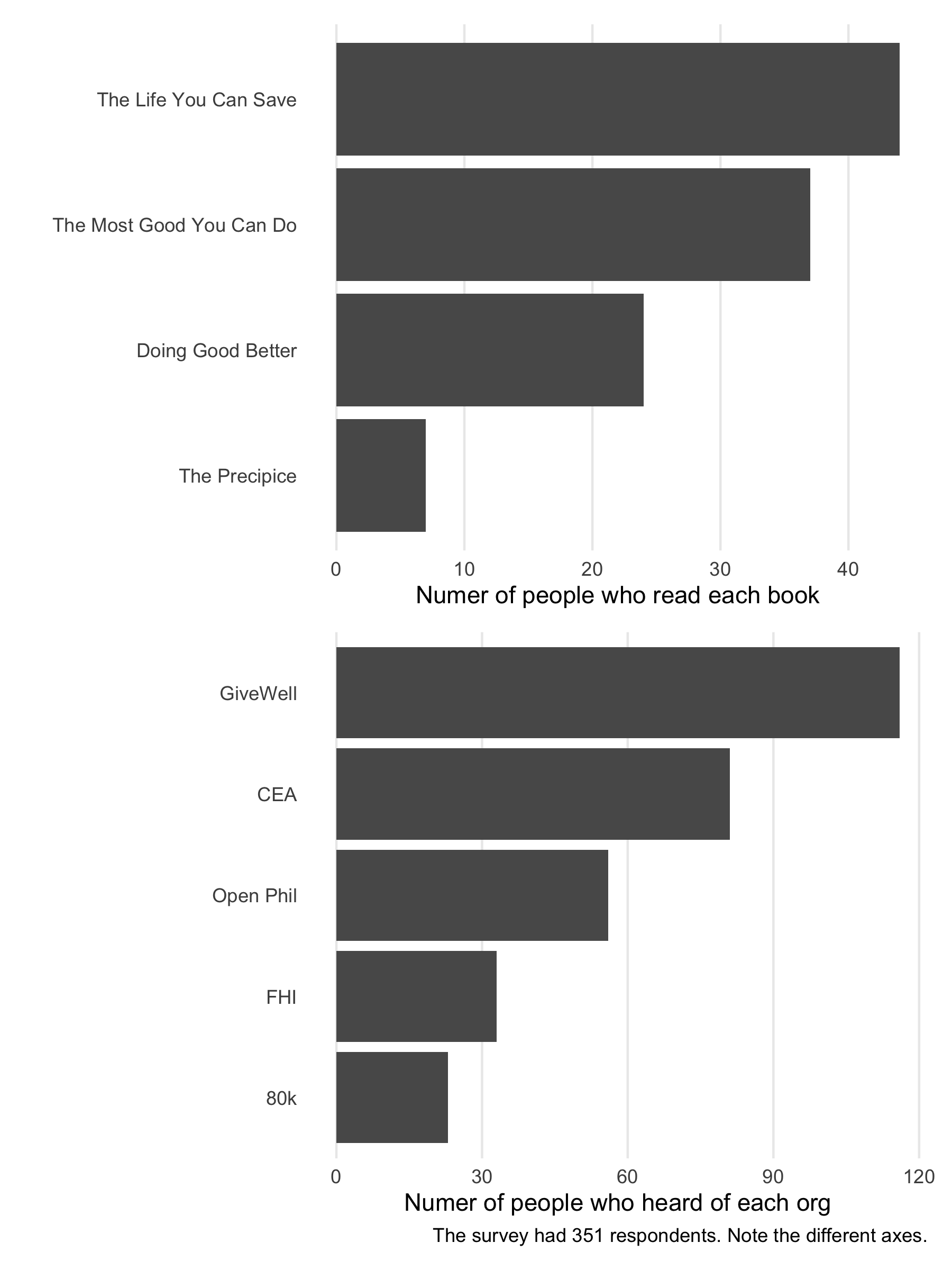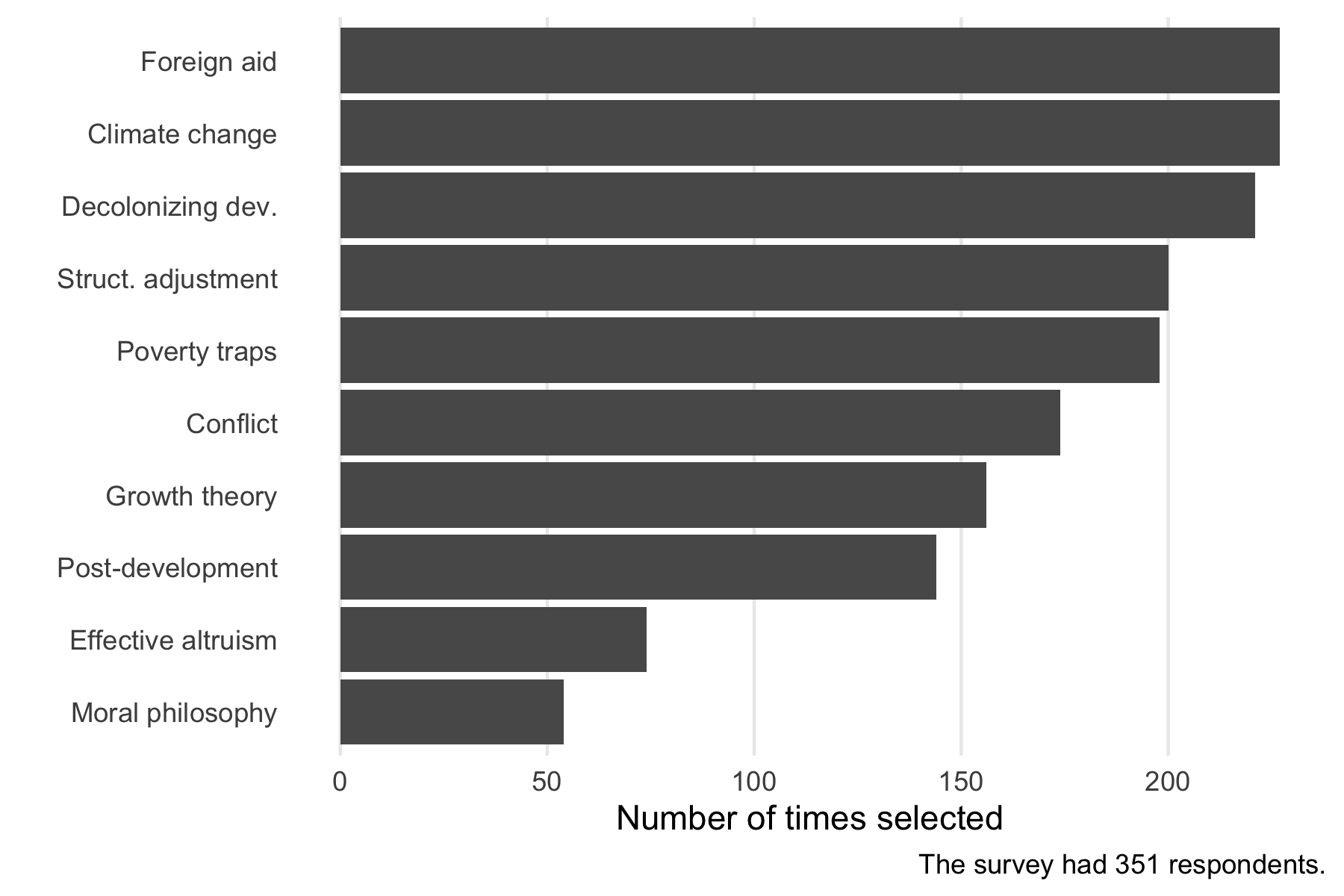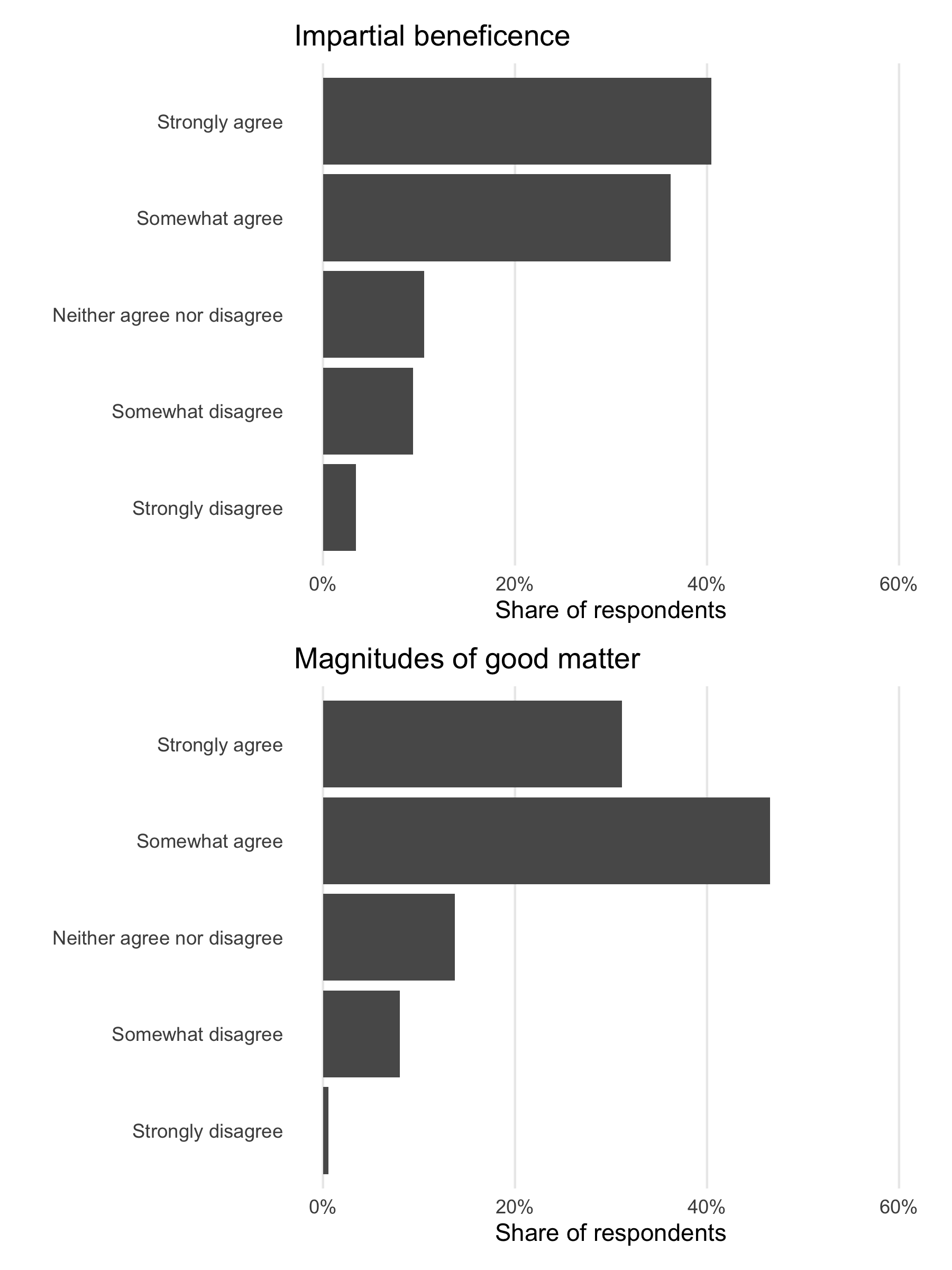I won an EA infrastructure fund grant a few months back that allowed me to survey all professors of international development[1] in Canada, the UK, and the US on their views on effective altruism (among other things). I'm a professor of international development and I wanted to do this because my view is that this community basically agrees with EA precepts but is unaware of EA. I think this is detrimental to our research and (especially) our teaching. I also think that raising EA awareness among this group is potentially high impact, as professors influence a lot of people who can then go on to do great things in the world.
IDEV professors do not know about EA
My key question just asked the professors if "they knew enough about effective altruism to discuss it with a friend." The answers are below.
| Familiar with EA | Canada | United States | United Kingdom |
|---|---|---|---|
| Yes | 12 | 50 | 25 |
| No | 60 | 121 | 83 |
Among those who said "yes", most were unable to get within a factor of 10 of the most likely right answer to two questions testing EA knowledge. Q1 asked for the multiple by which the highest cost-effectiveness charity outperforms a median one (I went with 100x). Q2 asked the minimum cost to save the life of a child, and I assumed the GiveWell benchmark of about 5000 USD.[2] I report both the median answers and the share within 10x of my best guess as to the right answer.
| Familiar with EA | Q1 median | 10x < Answer < 1000x | Q2 median | $500 < Answer < 50k | n |
|---|---|---|---|---|---|
| Yes | 4x | 0.26 | 72.5 USD | 0.22 | 87 |
| No | 3x | 0.14 | 58.5 USD | 0.13 | 264 |
Those who said that they were familiar with EA did better than those who were unfamiliar, but most people were far from the right answers and most answers mirrored the answers of the public at large (see also). This isn't surprising, as professors are quite specialized and most of us don't study these topics.
Most professors had not read EA-related books or heard of EA organizations.

My main takeaway here is just that professors don't know much about EA.
It should thus not be surprising that when I asked which topics a professor would devote at least 30 minutes of class time to in an introduction to international development course, the topics of EA and moral philosophy were the least likely to be covered, by a large margin.

Do IDEV professors already agree with (near-term) EA?
They basically do.
Almost 80% either strongly agree or agree that “From a moral perspective, people should care about the well-being of all human beings on the planet equally; they should not favour the well-being of people who are especially close to them either physically or emotionally” (Impartial beneficence).
The vast majority also agree that “when considering whether or not to devote time or money to a cause, one should think not merely about whether one will do good but also about how much good one will do.” (Magnitudes of good matter)

90% of professors gave to charity in the last year and 70% gave to a charity in a low or middle income country, though the most common reasons for giving were personal connections to the cause or specific charity.
Students and teaching
Finally, I asked the profs about students and teaching. The profs think that most students enrol in IDEV courses because they want to help the global poor. They think that students start out much too naive and optimistic about the prospects for global development, but that by the end of their program at least a substantial minority of students are overly pessimistic and jaded.
Conclusion
My main takeaway from all this is that IDEV profs agree with most (near-term) EA principles, but are unaware of EA. Even those that kind of have heard of EA don't actually know that much about it. These same professors often think that students start their programs of study (too) optimistic about development but that many graduate too pessimistic. I think a useful antidote to this pessimistic trend is... EA!
Personally, I often build EA content into my lectures because I find it useful. I like motivating my statistical methods courses (for IDEV students) with real development RCT examples. I like to draw on GiveWell's top charities when teaching concepts around cost-effectiveness.
I'll be hopefully running a similar survey on students in the Fall and I'm working on academic articles based on these results. If anyone wants to know more you can DM me here or on twitter.
If you're an IDEV student, um, maybe mention EA to your profs? They probably don't know what it is and they might find it fascinating.
And if anyone wants a fuller presentation of the results (along with more details and graphs), you can get that here.
- ^
I'm not going to get into technical details about the sample or whatnot in the main post as I think it is distracting. I will eventually publish academic work on this with lots of detail, and anyone can ask me questions about such things in the comments. I emailed about 2500 people and 351 took the survey. I basically tried to email everyone who was associated with a university IDEV program in each country, but figuring this out was a little complicated and we surely missed lots of profs.
- ^
The lowest credible estimate I've seen is 530 USD for seasonal malaria chemoprevention.

Did you ask any questions about people's impressions of EA (adjacent) organizations like JPAL, IDInisght, CGD or GiveWell?
I would also be curious whether you have intuitions on which subsets of the profession might be more or less interested in EA / contributing to the movement.
I did not ask for impressions about CGD, JPAL, etc. I did ask an EA "feeling thermometer" question about EA in general (of the subset of people who said they knew enough about EA to discuss with a friend), and I got this (0 is as negative as possible and 100 is as positive as possible):
That spike at 50 is an answer of total indifference, which again affirms that many of the people who said they knew about EA probably didn't know very much about it.
The question about "which subsets of the profession might be more or less interested in EA" is a very good one. I'm not sure, and I don't think I can really ask my data to speak to that (but maybe...).
I think the lowest hanging fruit is probably more technically oriented people (economists or quant-oriented political scientists or sociologists), but personally I think a fairly wide cross-section of international development profs could contribute and might be interested in doing so.
You might also be interested in the full report.
Nice work Ryan! This is really interesting. I would agree that exposing IDEV professors to EA would be a net positive. I'm wondering what are the best ways to do this. My cynical take (from my time in the academy) is that it's hard to get econ profs to take seriously knowledge generated in non-Econ circles. So maybe the way forward is to try to get an article on EA (or that would at least ex-post expose profs to EA) in QJE, or at least JDE. I'm not sure the right angle. But maybe you should come up with an idea and pitch it to EA Funds again!
I'm wondering where you think a paper on this topic will land. Probably not JDE, right?
Thanks. I basically agree with what you say, I'd just note that lots of IDEV profs aren't economists. I'm writing something I'll aim at World Development (then JDS, then JID, etc) based on the survey data, for exactly the reasons you describe.
What is the background of most IDEV professors? I'd also be curious more generally on an overview of the field and how it compares to e.g. developmental economics (I know very little about it!)
This is the breakdown of "discipline of PhD" in my sample.
Development economics is a subfield of economics, international development is an interdisciplinary research area. The two are related but not the same. I think most international development people would see development economists are part of their enterprise, but the inverse would typically not be true.
Thanks for sharing this! I hadn't really conceptualized the questions you asked as being "EA" – I had assumed that any sort of international development would need to benchmark on facts like the effectiveness of bed nets. Or at least international development professors would do better than the general public on this kind of thing; "international development is harder than you might think, even if people are pretty poor" seems like a very cold take in IDEV circles?
I guess my assumptions were wrong!
Isn't there a strong motivation for following-up with a conference introducing these professors to EA?
I think that idea has a lot of potential.
Nice work! Sounds like movement building is very important.
I took a development class in law school and thought the total focus on aid/politics/culture was a feature of it being in a law school. I guess not.
Wow, I'm surprised at how off the numbers are for the charity multipliers and the cost to save lives. Do you have any explanations for how they could be so divergent from EA views? You mention they're highly specialized, but I'm still surprised if their answers mirror the public's guesses more than EA's
If I wanted to be charitable to their answer of the cost of saving a life I'd point out that $5000 is roughly the cost of saving a life reliably and at scale. If you relax any of those conditions, saving a life might be cheaper (e.g. Givewell sometimes finances opportunities more cost-effective than AMF, or perhaps you're optimistic about some highly leveraged interventions like political advocacy). However, I wouldn't bet that this phenomenon would be behind a significant fraction of the divergence of their answers.
I think that's fair (see also, footnote 2). Fwiw this was the actual question: "Consider a charity whose programs are among the most cost-effective ways of saving the lives of children. In other words, thinking across all charities that currently exist, this one can save a child’s life for the smallest amount of money.
Roughly what do you think is the minimum amount of money that you would have to donate to this charity in order to expect that your money has saved the life of one child?”
Although many IDev professors (estimate: ~70%) are likely just poorly calibrated, and have no incentives to look into the cost-effectiveness of interventions, many who do know about CEAs might underestimate.
For "the cost to save the life of a child" question, an IDev policy expert might take a different perspective. In my IDev masters, one prof in his 70s explained that, if you've already paid the fixed costs of getting into the decision making process, it's very often possible to find low-hanging fruit policy changes that save more lives and cost less money (bottom right quadrant in the picture below, taken from one of his classes).
This is excellent work. I certainly think you should have included more detail!
Forgive my ignorance, but what is an international development professor? Are they political scientists who specialise in international development? Are they economists? Are they a separate track? What were their PhDs in? [Edit: I retract this, you already answered it in a different comment]
I think the simplest explanation for these results is that most university professors are staggeringly innumerate. This is analogous to the surveys that show that if you ask the average person what share of the government's budget is spent on different areas, it adds up to like 400% or something.
But if the sample contains economists or other highly quantitative fields, the results are particularly shocking. It would be interesting to compare STEM and non-STEM professors.
From the 80,000 Hours page, it seems many people cannot parse what Q2 means. When you ask what the minimum cost of doing something is, people seem to imagine scenarios in which they are in the right place at the right time to save a life. For example, in the 80k survey, some people answered that it would take $10 to save a child's life, because, if the child were dying right in front of them, that's how much it would cost for a day's worth of food and water. This is not necessarily the wrong answer; it is a valid answer to a totally different question.
Thanks for the kind words and thoughts. I wanted to keep the post short, but if you want more detail there is lots more in the link at the end.
I agree that that Q2 has some issues, but what makes Q2 is valuable is that other people have used it and so I have a collection of answers to the question from other samples (the public and experts). That's why I used it (and why I also added my own question, Q1).
There are a lot of economists in my sample, and at least in the US political scientists get a lot of quant methods training so their numeracy tends to be high (in the UK and Canada this varies from place to place). I don't think the issue is pure innumeracy. I also phrased the question so as to avoid some of the more common misinterpretations.
This was the actual question: "Consider a charity whose programs are among the most cost-effective ways of saving the lives of children. In other words, thinking across all charities that currently exist, this one can save a child’s life for the smallest amount of money.
Roughly what do you think is the minimum amount of money that you would have to donate to this charity in order to expect that your money has saved the life of one child?”